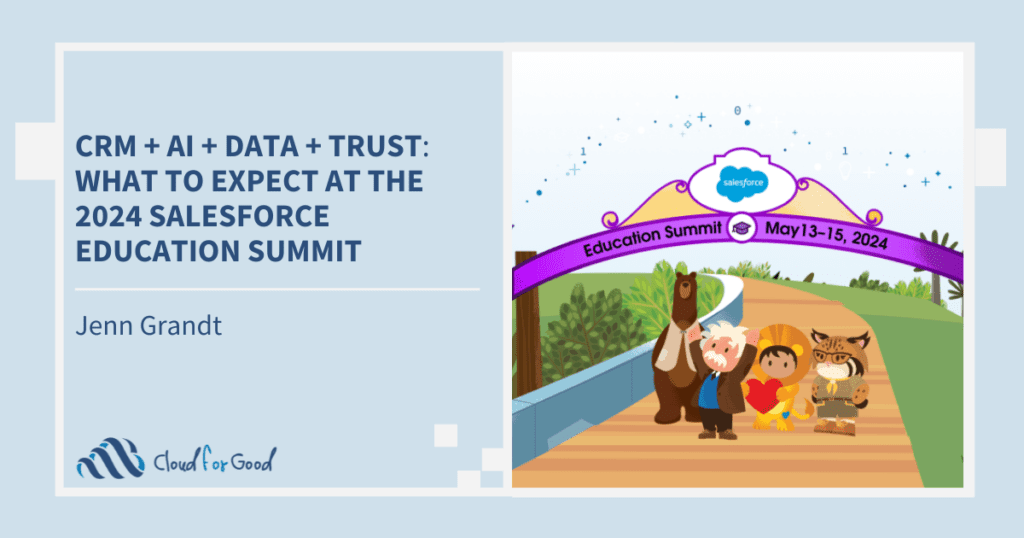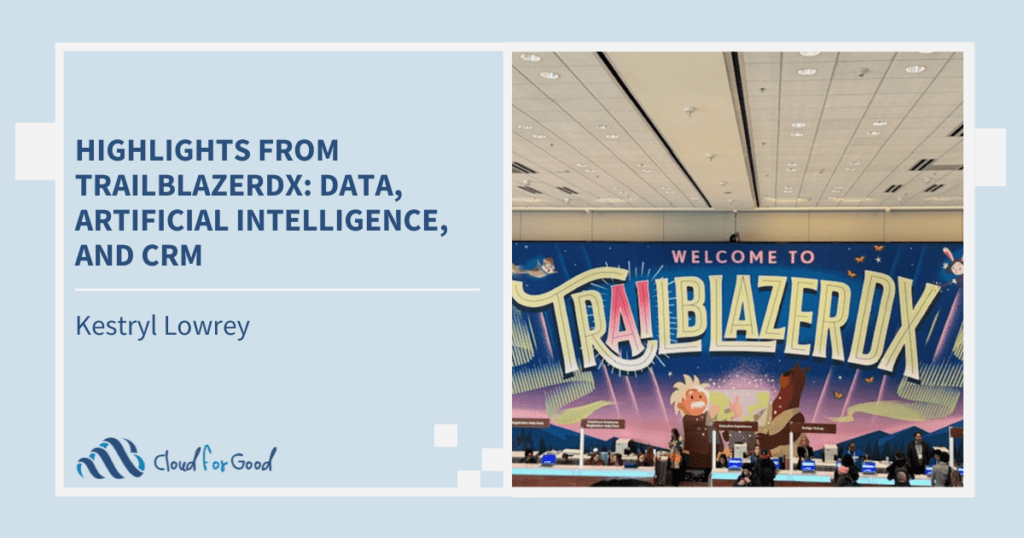Trish Perkins, a Cloud Consultant at Cloud for Good spoke with Kevin Bromer at Dreamforce 2012. Many of us in the nonprofit community know you as the guy who answers so many of our most complex questions on the Google Groups that support nonprofits, the Nonprofit Salesforce.com Practitioners group and the Nonprofit Starter Pack’s group. Kevin, what’s your official job title?
Kevin Bromer: My official title is Solutions Architect. My primary responsibilities are working with the Nonprofit Starter Pack, helping to develop the Nonprofit Starter Pack, and really to ensure that the community of Nonprofit Starter Pack customers are successfully using it.
Trish Perkins: So that’s how come you are the main Salesforce guy on the two Google groups that deal with nonprofit use of Salesforce?
Kevin Bromer: Those groups are an integral part of making sure that those users are successful. Having a place to go to not only listen to me blather on, but more importantly to learn from each other. It’s always great to hear, for instance, of two organizations doing similar work who say, “Oh, it’s interesting how you’re doing that. Let’s get together offline and talk about this.” To my mind, that’s awesome. It means they’re connecting out there, outside of the Google Group, outside of our purview and building that web of community that is so important for success.
Trish Perkins: Were you one of the initial architects of the starter pack?
Kevin Bromer: No, prior to coming to Salesforce, I worked for an organization that unfortunately no longer exists called NPower Seattle. I worked on Salesforce implementations for them for about three years. We actually used our own template at the time. A lot of that template became integrated into what is now the Nonprofit Starter Pack. The original work on the Starter Pack was done through a contractor that the Foundation hired back in 2008 or 2009 (maybe 2007, I’d have to check my history on that.) And then Steve Andersen, of course, ran that program.
Trish Perkins: Steve Andersen was THE MAN when I first started doing Salesforce work.
Kevin Bromer: Steve Andersen is STILL the man. He ran the program for about two years or so. As he was moving on up in the world and needed somebody to fill that position and because I had some experience working on a very similar platform with very similar code, it worked out to be a great fit, certainly for me, and hopefully for him.
Trish Perkins: Where do you think is biggest pain point at the moment with the Starter Pack?
Kevin Bromer: Are there pain points? I thought it…Are you sure? I’m just kidding of course. There are certainly some things in there.
Trish Perkins: Things that you think really need to be addressed.
Kevin Bromer: One that we heard quite a bit was being able to customize household naming, for example. So right now we wrote some—if I do say so myself—some pretty slick code that allows household names and greetings to adjust according to how a contact is entered, but you know, every organization wants to address their constituents a little bit differently.
Trish Perkins: That’s true, but why isn’t there an option for “Mr. and Mrs. John Jones”? Every conservation organization I work with is saying, “What???”
Kevin Bromer: So, we hear that loud and clear, and this year there was some amazing work done at the developer sprint back in May in San Francisco. The team put together an incredible foundation for allowing you to customize those names, something we’re really hoping to include in the next release of households, which will be a little ways down the line.
Trish Perkins: What else? Do we have any mail-merge things in the works?
Kevin Bromer: Well, you know, one of the things we philosophically do with the Starter Pack is to cover the pieces that aren’t being covered by the community of ISPs and partners. So there are some really nice mail merge tools out there that are available and most of them are deeply discounted for nonprofits, if not free. That feels like a space that’s been filled really nicely. That’s great, that’s exactly what one of the philosophical tenets of the Starter Pack is intended to be which is to help catalyze that kind of development. That’s exciting to see that that is happening.
We’ve got a new release of Relationships that will be coming out sometime in the next couple of months. Some amazing work done on that, also at the developer sprints by some partners. That’s going to include reciprocal relationships and gendered relationships, and all of that that will be customizable. If you don’t want to use them you don’t have to and you can define however you want to define gender. Including also some visualization tools for relationships, so you can look at a moving graph of everybody and how they’re connected.
Trish Perkins: Sort of like how you’ve done households? We like that.
Kevin Bromer: Similar. Relationships are built on a platform called arbor.js. It’s a physics engine. We looked at the way relationship visualization had been done in some other places and I don’t really like the static graphs that have been drawn out. We want something you can move around and it feels like you’re floating with bubbles. That’s what it was designed around and that’s what it does. We’re working on finishing that up. We’ve got another application that will coming out in the interim and after that’s out we’ll get relationships out the door.
Trish Perkins: What is the part of your work that you find the most gratifying?
Kevin Bromer: You know, it’s seeing organizations actually be successful using Salesforce for nonprofit work. One of the toughest things about my job is that I don’t get to work very closely, one-on-one, with organizations. When you’re a consultant, as you know, you get that joy of somebody who’s using spreadsheets or maybe even the Starter Pack or something else—whatever they were doing, and help evolve their processes to a place that has some more sophistication to it. We’ve got 5,500 organizations out there that use the Starter Pack, a little bit more than that, and I can’t possibly talk to all of them. But when somebody comes up to me and says, “Hey, I just want to let you know that we’ve started using it, we love it, it works great, our organization has changed the way we do fundraising, or it’s enabled us to do X, it’s enabled us to do Y…” – that’s really rewarding. For me, that’s the whole reason why I’m doing this. It doesn’t matter to me if Affinaquest is the right fit, if RoundCause is the right fit, if the Starter Pack is the right fit. At the end of the day, all I really care about is that they’re successful. Being able to provide a tool that’s free and open source and seems to be able to help organizations be successful, that really tickles me.





